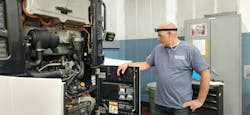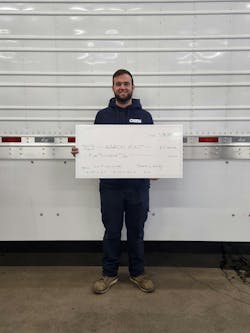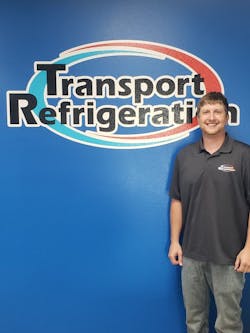For more on reefer trailers:
What you'll learn in this article:
- Some of the common issues techs need to look for in reefers
- How three reefer technicians approach the diagnostic process
No matter the season, refrigerated trailers are a critical part of the trucking industry and the U.S. economy, as a late load may not just put a dent in a supplier’s schedule, but may mean the loss of perishable cargo. This makes reefer maintenance an important and specialized segment of the commercial vehicle repair market.
Thermo King makes sure that its technicians are up to the task by holding a Top Tech Dealer Technician competition each year. Out of 2024’s 120 participants, Scott DeWaal of the Utah-based Peak Thermo King was the Top Tech Dealer Technician; followed by Master Technician/Leadman Aaron Hunt from CSTK East in Philadelphia, Pennsylvania; and Nathan Morris of Transport Refrigeration, Inc. in De Pere, Wisconsin.
The three technicians share 53 years of experience between them, so we took the time to catch up with them after the competition to discuss their careers and some of the finer points of refrigerated trailer maintenance.
[Editor’s note: Answers have been edited for clarity and length.]
FM: How long have you worked as a technician? How did you get into the trade?
Scott DeWaal: I have worked for Thermo King for over 22 years. I enrolled at Davis Applied Technology Center while in high school and later graduated with an associate degree in Heavy Duty Diesel Mechanics from Weber State University. I started working as a technician in high school for a construction company that hauled reefers, and I spent nearly five years there, working on both construction equipment and refrigeration units.
Aaron Hunt: I've been at Thermo King/CSTK for 12 years. After graduating high school, I attended Universal Technical Institute for industrial diesel. During my time at UTI, one of the classes covered refrigeration/reefer units, which seemed like a good line of work to get into — it was something that would always be in demand. While still at UTI, I applied for a job at CSTK and was accepted. I graduated from UTI, had two weeks off, and then started at CSTK, where I’ve been ever since.
Nathan Morris: I have been in the industry for 19 years. My interest in mechanical work developed through my experiences racing karts and cars during high school. I enrolled in an automotive course at school, and throughout the year, trade school recruiters would visit. A recruiter from WyoTech persuaded me that their diesel program in Laramie, Wyoming, would be an excellent opportunity. I completed their six-month diesel course, followed by a three-month advanced diesel course.
After graduating and returning home, a family friend helped me secure a position as a truck mechanic at a fleet shop in Green Bay, Wisconsin. Early in my career, I realized that working on trucks might not be the best fit for me. I approached the manager, who suggested I try working on their reefer units instead. I accepted the challenge and found that I truly enjoyed it.
FM: What is your diagnostic process like for reefers and APUs?
SDW: I first review the customer complaint, then go to the unit and open the panels and doors for a thorough visual inspection. I run the unit, download its data, and check if the condition reoccurs. If the issue is obvious, I diagnose it from there. If no clear issue exists, I analyze the download and identify the conditions under which it failed. I then try to replicate the situation to further diagnose the problem. For intermittent issues or multi-temp trailers, reviewing the unit’s history is essential to accurately identify and repair the problem.
AH: Reefers and APUs all have alarm codes that indicate when something isn’t right. We can also download unit data to see what was happening before, during and after the alarm codes. Taking this info and using diagnostic books will guide you down the correct path to finding the problem, whether it's an engine, electrical, or refrigeration issue.
FM: What are some of the most common issues you come across in reefers and APUs?
SDW: The most common issues are often small things that should have been addressed during a PM service. For example, a broken refrigerant clamp can allow lines to vibrate and create a leak. Fuel lines may start rubbing together, also eventually causing leaks. An overdue PM service can lead to fuel-related shutdowns. A loose fan belt can slip so badly that the unit doesn’t function properly. An APU heater can become completely plugged up and fail to run.
AH: Reefers and APUs are outside 24/7 and exposed to the elements, so they take a beating. We see issues ranging from corroded wires to refrigerant leaks to fuel system problems and everything in between.
NM: Software bugs in new products or issues caused by vendor changes are common, and supply chain challenges have been a real struggle over the last three to four years. However, most of the issues we see are due to a lack of maintenance or the product being used in a manner for which it wasn't designed.
FM: What is one challenging diagnostic issue you can recall over the past few months and how did you address it?
SDW: One of the recent diagnostic challenges I faced was an electrical issue. The unit wouldn’t run and displayed a 35 code. I followed all the standard diagnostic steps for that code but couldn’t pinpoint the problem. The unit had electric standby, so I unplugged the electric standby plug on the control board. When I did, the code cleared itself, and the unit started up and ran. However, it eventually shut down again because the generator contactor didn’t engage. This confirmed that the issue was within the electric standby circuit.
After further troubleshooting, I found a broken ground on one of the contactors, which was causing power feedback to the micro and triggering the issue. Once I fixed the ground, the unit ran fine.
NM: I got a call from a fellow tech at our Madison, Wisconsin, branch who was having trouble with a unit that kept losing communication with a module every time it tried to start up. He mentioned that he had followed all the diagnostic steps in the manual, and everything seemed fine. I figured it had to be a power or ground issue, so I told him to check for weak batteries, loose connections, voltage drops, and if the CAN was terminating resistance.
He called back and said everything still checked out, but he noticed the electric fuel pump wasn’t working. I suggested he unplug the fuel pump to see if anything changed. He called me back and said the unit was no longer losing communication with the module on startup. It turned out the fuel pump was shorted to ground, which must have been tripping a FET in the module and causing the communication loss. It was a rare scenario, but after replacing the fuel pump, the unit has been running smoothly ever since.
About the Author

Alex Keenan
Alex Keenan is an Associate Editor for Fleet Maintenance magazine. She has written on a variety of topics for the past several years and recently joined the transportation industry, reviewing content covering technician challenges and breaking industry news. She holds a bachelor's degree in English from Colorado State University in Fort Collins, Colorado.



